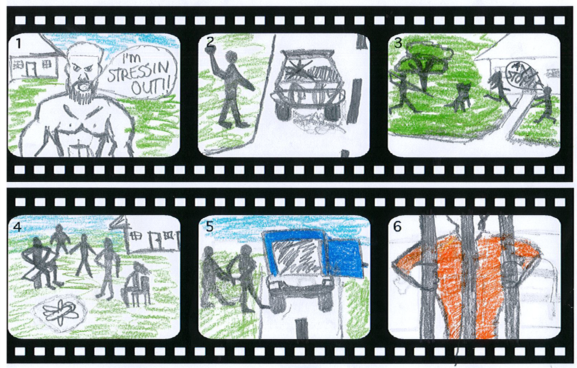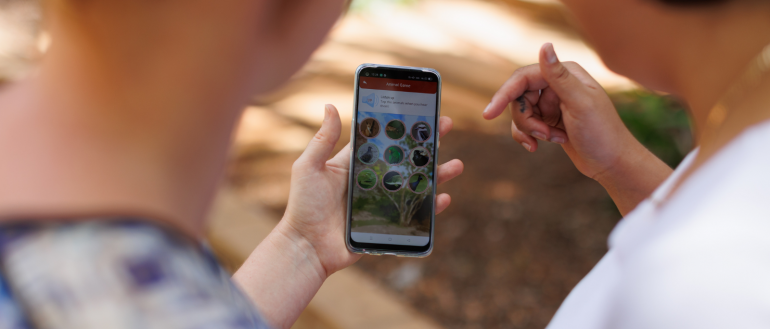A new mobile phone app has been shown to support the mental health of First Nations youth after building on the success of previous Menzies programs and work with young people.
Key stakeholders helped develop the ‘Aboriginal and Islander Mental Health Initiative for Youth’ (AIMhi-Y) app. The strengths-based, storytelling app integrates education and mental health treatment into a fun, gamified and interactive app.
The digital mental health tool is part of an ongoing project aimed at improving the mental health and wellbeing of Aboriginal and Torres Strait Islander young people.
A new paper published in February 2022 presents an in-depth account of the second phase of the participatory design process to further develop the AIMhi-Y mobile phone app.
Lead author and Menzies Project Coordinator Josie Povey said the new study aims to determine the design and function priorities to improve the app. Aboriginal and Torres Strait Islander young people and service providers were involved in the collaboration which looked at the integration of evidence and best practice recommendations.
Young people and service providers were recruited across 3 sites - 2 schools and a residential drug rehabilitation facility.
“All 3 sites that engaged in phase one of the co-design process continued their engagement in phase 2 – each site supported young Aboriginal or Torres Strait Islander people, aged between 8 and 18 years, to participate,” Josie said.
After completing the co-design workshops at the schools and residential rehabilitation facility, a separate group of young people was recruited to form an Indigenous Youth Reference Group (IYRG). This group provided feedback throughout the app development stage.
Guidance from 4 Indigenous researchers played a vital role in establishing rapport, developing and refining data collection activities, and interpreting during face-to-face discussions.
Young people involved in the project shared their preferences for app content, activity types, engagement strategies, interface, graphic design, and language options.
Female IYRG participants aged 15-17 years said they preferred activities that incorporated strengths-based mental health information and skill development.
“It’s looking like a good app...add more videos...[make them] short, talking about mental health and wellbeing...[I] like the depth of the animal game with the mindfulness part.”
Participants also valued options to customize, personalize, gamify, prompt real-world action, allow exploration, and provide unlimited use. One 15-year-old female co-design workshop participant said she like being able to see her progress.
“As you went down the path...have footsteps to show you have moved...the sound of feet crunching on dirt...things that...reflect the decision you made.”
Participants valued storytelling with relatable characters, which helped build trust and prompt reflection. An 18-year-old male participant of a co-design workshop provided a visual description of body-stressing, along with a verbal explanation as part of the workshop.

“[He is] feeling stressed can lead to sickness, drugs and alcohol and car crash, [he is an] angry man...getting in trouble with police – gettin' sent to prison...he is trying to kill himself...he gotta stop gunja (marijuana), be with family...recovery...he [character] should tell the story - he should tell it after [it's happened]...Mum as well - yeah she can tell her part of the story...[and] uncle for taking him out hunting, like see the difference.”
Young people and service providers valued strengths-based brief interventions. They identified prototypes that integrated a culturally responsive, low-intensity Cognitive Behaviour Therapy (CBT) intervention as appealing.
This preference was in line with current evidence which highlights that strengths-based, culturally adapted, low-intensity CBT and Acceptance Commitment Therapy have been shown to be effective with Aboriginal and Torres Strait Islander people.
“One of the key challenges throughout [this project] was maintaining young people’s interest and engagement through culturally safe processes over a 2-year time frame,” Josie said.
“The ongoing engagement of all sites and young people throughout multiple phases of this project and the rich in-depth data collected suggest that the strategies used were reasonably successful – these included working within supportive schools and services and employing youth and senior Indigenous researchers with established connections to the community.”
A recently completed 2021 pilot study has demonstrated the AIMhi-Y app’s utility to improve wellbeing. A 3-year implementation project is currently underway to support its use in youth-focused services across the NT and South Australia.
For more information please visit: Aboriginal and Islander Mental Health Initiative for Youth (AIMhi-Y) - Menzies
**
The new paper: Determining Priorities in the Aboriginal and Islander Mental Health Initiative for Youth App Second Phase Participatory Design Project: Qualitative Study and Narrative Literature Review, was published February 2022, and is available online: doi:10.2196/28342
**
The earlier paper: Drafting the Aboriginal and Islander Mental Health Initiative for Youth (AIMhi-Y) App: Results of a formative mixed methods study, was published in April 2020, and is available at: https://pubmed.ncbi.nlm.nih.gov/32477884/

